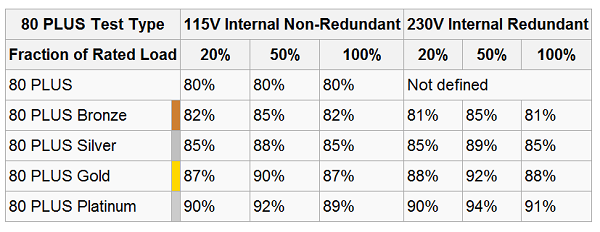Connections
Most people don’t really think about it until it’s too late, but having enough connections on the power supply is equally as important. Many low end PSU makers have as few connectors as possible, generally just enough to set up a basic computer, the 20/24 mother board connector, and a few molex wires. This ensures 2 things; that they can charge less for the drive by using less parts, and that you can’t overload the PSU as easily. If you only have enough to connect the barebones basics of the computer then it will be much harder for you to overload the PSU. Many higher end graphics cards need 1 to 2 6 pin connectors to run, if you only supply 0-1 connector then you can ensure that the builders can only use lower power graphics cards in the build.
Efficiency

The efficiency rating is used to let the consumer know how much power is wasted during use due to heat. A 600 watt PSU with a 60% rating will have an input of 1000 watts, meaning that 400 watts are being wasted due to heat, but a supply with an 80% rating would have an input of 750 watts and would be only wasting 150 watts. These ratings come with multiple levels ranging from the standard 80 PLUS to 80 PLUS Platinum, which uses 90% efficiency and to give a point of reference, a 600 watt PSU would have an input of only 666 watts with only 66 watts being wasted. Be wary of any PSU brand that doesn’t specifically say that they have an 80 PLUS rating, as many will try to incorporate something like 85 plus into the name of the PSU, even though 85 plus is not a standard.
Single vs. Mutli Rail PSU
As seen by the example before, you can have many PSU’s with single or multiple 12 volt rails, these tend to be very tricky for consumers, with the simplest answer being it doesn’t matter either way. Many 12 Volt rails aren’t truly 12 volt rails, but are allows to be labeled this way do to a few engineering tricks. Having a single vs. Multi rail PSU has very little to do with performance and should just be ignored by the vast majority of consumers.
Know how much power you need
It’s easy to say just by the best and you won’t have to worry, but if you never use more than 300 watts is it necessary to buy a 1000 watt PSU just in case? Most people would say no, and buying a PSU that is overkill isn’t helping you any. Luckily there are sites that can give you a rough estimate on how much power you will need to run your system, although they tend to overestimate just in case.
For a basic PSU calculator Newegg’s works a like a charm http://educations.newegg.com/tool/psucalc/index.html
For people who want a more exact calculator that takes into account specific parts, then Thermaltake’s calculator is the way to go. http://www.thermaltake.outervision.com/Power






